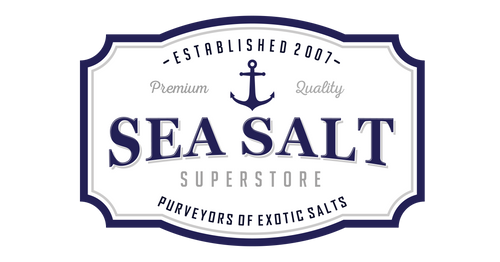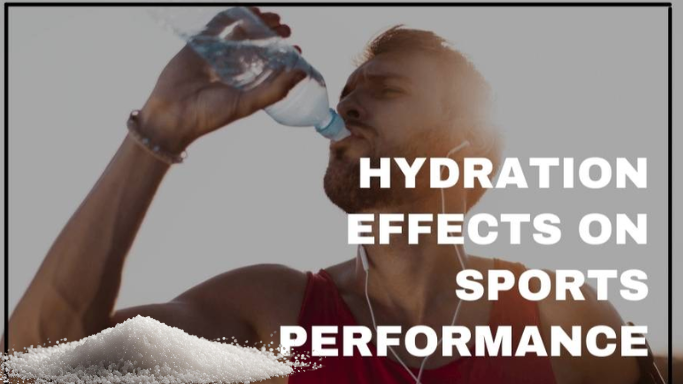Hydration is crucial for athletic performance, but simply drinking water isn't always enough. When athletes engage in prolonged exercise or high-intensity activity, they lose not only water but also electrolytes, including sodium, potassium, calcium, and magnesium, through sweat. Among these electrolytes, sodium (found in salt) plays a critical role in maintaining hydration levels and preventing electrolyte imbalances.
1. Sodium and Fluid Balance
One of the primary reasons athletes use salt for hydration is that sodium helps regulate fluid balance in the body. Sodium is an essential electrolyte that plays a key role in maintaining the balance of fluids inside and outside the cells. When you sweat, sodium is lost along with water, and this depletion can lead to hyponatremia, a condition where the sodium levels in the blood drop too low.
In order to maintain optimal hydration, sodium helps to:
-
Retain Water: Sodium helps your body retain water by pulling it into the bloodstream and cells. This is why sports drinks often contain salt—because they promote fluid retention in the body, helping to prevent dehydration.
-
Maintain Blood Volume: By regulating the balance of fluids, sodium helps maintain blood volume during exercise. A proper blood volume ensures that muscles and organs continue to receive the oxygen and nutrients they need for performance.
2. Prevention of Hyponatremia
Hyponatremia, also known as "water intoxication," is a condition that can occur when athletes drink excessive amounts of water without replenishing their sodium levels. This dilutes the sodium concentration in the blood, leading to symptoms such as headache, nausea, dizziness, and, in extreme cases, seizures or coma.
When athletes sweat, they not only lose water but also sodium, which is critical to replace for proper hydration. Consuming beverages or foods containing electrolytes (like salt) ensures that the body maintains the right balance of fluids. This is especially important during long-duration endurance events like marathons or triathlons, where the body loses large amounts of sweat over an extended period of time.
3. Electrolyte Replenishment for Muscle Function
Salt is also vital for muscle function. During exercise, muscles rely on a delicate balance of sodium and other electrolytes like potassium to function properly. When sodium levels fall too low, muscle cramps can occur. Sodium helps regulate muscle contractions by facilitating the exchange of fluids between cells and muscles, ensuring they function efficiently.
When athletes sweat heavily, they lose sodium and other electrolytes that are necessary for optimal muscle performance. This is why athletes often consume electrolyte-rich drinks, snacks, or supplements during long or intense workouts to replenish the sodium lost through sweat.
4. How Salt Helps in Rehydration
After intense exercise or competition, rehydration is essential for recovery. Sodium is particularly important during this process because it enhances water absorption in the intestines. This means that adding a small amount of salt to your water can help the body absorb fluids more efficiently, speeding up the rehydration process.
For example, sports drinks designed for athletes typically contain both sugar and sodium because the sugar helps promote fluid absorption in the intestines, while sodium helps maintain hydration and electrolyte balance. In fact, consuming a mix of carbohydrates (from sugars) and electrolytes (like sodium) has been shown to be more effective at rehydrating the body than water alone.
5. Optimal Hydration Strategy for Athletes
While consuming salt is important for hydration, it's essential for athletes to find the right balance. Too much salt can have negative effects, including high blood pressure or kidney strain. However, the benefits of adding a moderate amount of salt during exercise and recovery far outweigh the risks, especially in hot and humid environments where sweat loss is more significant.
Here are a few strategies athletes can use to incorporate salt into their hydration plan:
-
Electrolyte Drinks: Many sports drinks are designed to provide the right balance of fluids, sodium, and other electrolytes. Opt for drinks that contain between 200–500 mg of sodium per liter for optimal hydration during exercise.
-
Salt Tablets: Some athletes use electrolyte tablets or salt tablets to replenish sodium during long training sessions or events. These can be taken with water to ensure that sodium levels remain stable throughout physical exertion.
-
Salty Snacks: Snacking on salty foods like pretzels, salted nuts, or even adding a pinch of salt to water can help athletes replace lost sodium during training or recovery.
-
Coconut Water: A natural alternative to sports drinks, coconut water is rich in potassium and contains a small amount of sodium, making it a good option for replenishing electrolytes after a workout.
6. The Role of Salt in Hot Weather
Hot weather conditions can exacerbate fluid loss through sweat, making proper hydration even more critical. In these conditions, athletes should be mindful of both fluid and sodium intake to avoid dehydration and heat-related issues, like heat exhaustion or heatstroke. In addition to drinking water, adding salt to beverages or consuming electrolyte drinks can help athletes maintain hydration levels in extreme heat.
7. Post-Exercise Recovery with Salt
Post-exercise, sodium plays an important role in helping athletes recover. After sweat-induced sodium loss, it’s essential to replenish not just water but also electrolytes to ensure proper muscle function, prevent cramping, and support optimal recovery. Adding a pinch of salt to water or consuming an electrolyte-rich beverage or snack can aid the recovery process by promoting fluid absorption and maintaining electrolyte balance.
Conclusion
Salt is a crucial component of an athlete’s hydration strategy, especially during intense physical activity or endurance sports. Sodium helps the body maintain fluid balance, prevent dehydration, and support muscle function. By replenishing lost sodium through salt, athletes can avoid complications like hyponatremia, improve their performance, and speed up recovery. However, it’s important to strike the right balance—too little salt can lead to dehydration, while too much can have adverse effects. Incorporating electrolyte-rich beverages or snacks into your hydration routine can help ensure that your body stays hydrated and functions at its best, especially in hot or demanding conditions.




